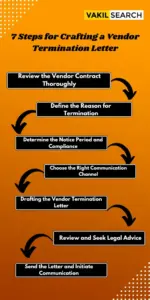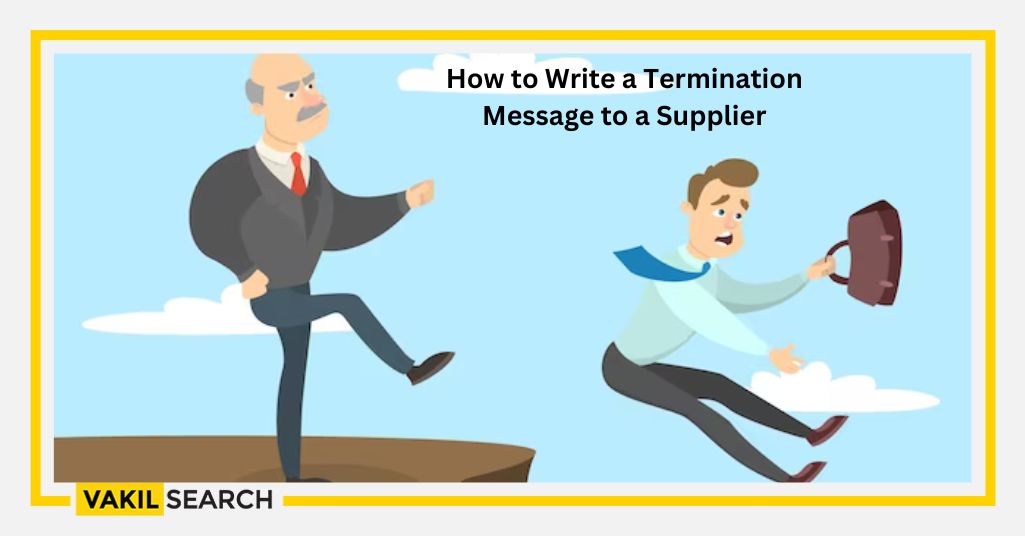Discover the finesse of vendor contract terminations. Navigate emotions, legality, and ethics with our guide. Learn steps, tips, and insights for smooth transitions in this professional process.
In the realm of business operations, relationships with vendors play a pivotal role. These relationships are often formalized through vendor contracts, which outline the terms and conditions of the agreement between a company and its suppliers. However, situations may arise where it becomes necessary to terminate these vendor contracts. In such instances, a well-crafted Vendor Termination Letter is crucial to ensure the process is handled professionally and amicably. This comprehensive guide provides insights into writing a Contract Termination Letter to Vendor with finesse, offering a template, writing tips, and a deeper understanding of the concept.
What Exactly is a Vendor Contract?
A vendor contract, also known as a supplier agreement or vendor agreement, is a legally binding document that outlines the terms and conditions of the relationship between a company and its suppliers. These contracts establish the expectations, responsibilities, and rights of both parties involved. Vendor contracts can encompass various aspects, including the supply of goods or services, pricing, delivery schedules, payment terms, confidentiality clauses, and more. These agreements are designed to protect the interests of both the company and the vendor and ensure a smooth business relationship.
Writing Tips: Cancellation Letter to Vendor
Crafting a Vendor Termination Letter necessitates a delicate balance of professionalism, clarity, and empathy. Here are some essential writing tips to consider:
Clear and Concise Language: Use straightforward language to clearly communicate your intent to terminate the vendor contract. Ambiguity can lead to misunderstandings.
Provide Adequate Notice: Many vendor contracts stipulate a notice period for termination. Adhere to this period and clearly mention it in the letter. This provides the vendor with sufficient time to make necessary adjustments.
Express Reasoning: While not always mandatory, providing a brief reason for the termination can help vendors understand your decision better. Be honest and objective in your explanation.
Professional Tone: Maintain a professional and respectful tone throughout the letter. Avoid using emotional language or blaming the vendor.
Encourage a Smooth Transition: Express your willingness to cooperate during the transition phase. Offer assistance in transferring responsibilities to a new vendor if applicable.
Review Contract Terms: Before drafting the letter, review the terms and conditions of the vendor contract to ensure compliance with any clauses related to termination.
Template for Cancellation Letter Format
[Your Company’s Letterhead]
[Date]
[Vendor’s Name]
[Vendor’s Address]
Dear [Vendor’s Name],
Subject: Notice of Vendor Contract Termination
I hope this letter finds you well. We appreciate the business relationship we have shared over the past [duration of the contract]. Regrettably, after careful consideration, we have decided to terminate our vendor contract, effective [termination date as per contract terms or notice period].
We want to assure you that this decision was not reached lightly. While we have valued the services provided by [Vendor’s Company Name], recent changes in our business strategy have led us to reevaluate our vendor partnerships. This strategic shift requires us to explore new directions, and as a result, we must terminate our current agreement.
We understand the importance of a smooth transition and are committed to collaborating with you to ensure minimal disruptions. Our team is prepared to assist in transferring responsibilities and knowledge to facilitate a seamless handover.
Please be aware that all outstanding obligations and commitments will be honored until the termination date. We kindly request your cooperation in this matter.
We extend our gratitude for your contributions to our company during our collaboration. We wish you every success in your future endeavors.
Thank you for your understanding.
Sincerely,
[Your Name]
[Your Title]
[Your Contact Information]
The Precondition for Writing a Termination Message to the Supplier
Before initiating the composition of a Vendor Termination Letter, it’s essential to address specific prerequisites:
Contract Review: Thoroughly review the vendor contract to ensure compliance with terms related to termination notice periods, reasons for termination, and any applicable penalties.
Decision Justification: Clearly define the reasons for the contract termination. This could be due to changes in business strategy, vendor non-compliance, financial concerns, or other valid reasons.
Transition Plan: Develop a plan to transition responsibilities smoothly from the current vendor to an alternative solution. This can help minimize disruptions in your business operations.
The Emotional and Legal Aspects of Vendor Termination
Navigating the Delicate Balance: Addressing Vendor Termination Emotions
Understanding the Legal Implications of Vendor Contract Termination
Crafting a Vendor Termination Letter: A Step-by-Step Guide
Step 1: Review the Vendor Contract Thoroughly
Step 2: Define the Reason for Termination
Step 3: Determine the Notice Period and Compliance
Step 4: Choose the Right Communication Channel
Step 5: Drafting the Vendor Termination Letter
Step 6: Review and Seek Legal Advice
Step 7: Send the Letter and Initiate Communication
Ensuring Compliance and Mitigating Risks in Vendor Terminations
Legal Considerations: Breach of Contract and Legal Remedies
Mitigating Financial and Operational Risks during the Transition
The Ethical Dimension: Treating Vendors with Respect and Fairness
Transparency and Honesty: Building Trust through Open Communication
Managing Expectations: Addressing Vendors’ Concerns and Questions
The Role of Effective Vendor Management in Business Success
Why Vendor Management Matters: Impact on Efficiency and Costs
Lessons Learned: Utilizing Termination Experiences for Better Vendor Relationships
Conclusion: Cultivating Professionalism in Vendor Contract Termination
In the intricate web of business relationships, the termination of a vendor contract stands as a critical juncture. This process demands a profound understanding of both emotional sensitivities and legal intricacies. The termination of a vendor contract is not just a transactional event; it’s a balance between honoring commitments, protecting the company’s interests, and upholding professional integrity.
The Emotional and Legal Aspects of Vendor Termination
Navigating the Delicate Balance: Addressing Vendor Termination Emotions
Terminating a vendor contract often stirs emotions on both sides of the relationship. While the company must prioritize its own needs, it’s important to acknowledge the vendor’s feelings. Empathy and clear communication can help mitigate potential conflicts and maintain a positive industry reputation.
Understanding the Legal Implications of Vendor Contract Termination
Vendor contracts are legally binding agreements, and their termination involves various legal considerations. Breach of contract, penalties, and potential disputes should be approached with caution. Seeking legal advice ensures that the termination process aligns with contractual obligations and minimizes legal risks.
Crafting a Vendor Termination Letter: A Step-by-Step Guide

Step 1: Review the Vendor Contract Thoroughly
Before drafting a Vendor Termination Letter, thoroughly review the contract to understand termination clauses, notice periods, and potential consequences. This step is vital to ensure compliance and avoid unnecessary legal complications.
Step 2: Define the Reason for Termination
Clear communication requires a well-defined reason for termination. Whether it’s due to business strategy changes, vendor non-compliance, financial constraints, or quality concerns, articulate the rationale objectively and without emotional bias.
Step 3: Determine the Notice Period and Compliance
Adhere to the notice period stipulated in the contract. Failing to provide adequate notice can lead to disputes or legal repercussions. Additionally, ensure compliance with any specific conditions for termination outlined in the contract.
Step 4: Choose the Right Communication Channel
Decide whether the termination notice will be delivered via email, formal letter, or other means. Consider the nature of your relationship with the vendor and the urgency of the situation when choosing the appropriate channel.
Step 5: Drafting the Vendor Termination Letter
Utilize the provided template as a framework to create a personalized Vendor Termination Letter. Tailor the letter to your specific situation, including relevant details, the reason for termination, the effective date, and your commitment to a smooth transition.
Step 6: Review and Seek Legal Advice
Thoroughly review the drafted letter for accuracy, clarity, and professionalism. If necessary, consult legal counsel to ensure the letter aligns with legal requirements and mitigates potential risks.
Step 7: Send the Letter and Initiate Communication
Once reviewed and approved, send the Vendor Termination Letter to the vendor. Initiate communication to discuss the termination process, transition plans, and address any questions or concerns they may have.
Ensuring Compliance and Mitigating Risks in Vendor Terminations
Legal Considerations: Breach of Contract and Legal Remedies
A breached contract can result in significant legal consequences. Companies must be aware of their rights and responsibilities outlined in the contract, including potential remedies for breach and methods of dispute resolution.
Mitigating Financial and Operational Risks during the Transition
Effective transition planning is paramount to avoid disruptions in business operations. A well-executed transition plan ensures the seamless transfer of responsibilities, minimizes financial risks, and safeguards the company’s interests.
The Ethical Dimension: Treating Vendors with Respect and Fairness
Transparency and Honesty: Building Trust through Open Communication
Transparent communication about the reasons for termination, the process, and the transition plan fosters trust between the parties involved. Openness can lead to smoother negotiations and a more amicable parting.
Managing Expectations: Addressing Vendors’ Concerns and Questions
Vendors may have concerns about the impact of termination on their business. Addressing these concerns honestly and providing necessary information can help vendors understand the situation and plan accordingly.
The Role of Effective Vendor Management in Business Success
Why Vendor Management Matters: Impact on Efficiency and Costs
Vendor relationships significantly impact a company’s efficiency, cost management, and overall performance. Effective vendor management ensures that partnerships align with business goals and contribute positively to the bottom line.
Lessons Learned: Utilizing Termination Experiences for Better Vendor Relationships
The lessons learned from vendor contract terminations can be valuable in shaping future vendor relationships. Companies can use these experiences to refine their vendor selection processes, negotiation strategies, and contract management practices
Conclusion
In the complex world of vendor relationships, contract terminations are occasionally unavoidable. By adhering to a well-structured Vendor Termination Letter, businesses can navigate these challenges with professionalism and grace. Clear communication, a professional tone, and a commitment to a seamless transition all contribute to maintaining the integrity of the business ecosystem.
FAQ:
What is a Vendor Termination Letter?
A Vendor Termination Letter is a formal document sent by a company to its suppliers to communicate the decision to terminate an existing vendor contract. This letter outlines the reasons for termination, the effective date, and any necessary transition arrangements.
Why would a company need to send a Vendor Termination Letter?
Companies may need to send a Vendor Termination Letter due to various reasons, such as changes in business strategy, vendor non-compliance, budget constraints, quality issues, or the need to explore new vendor partnerships.
What should be included in a Vendor Termination Letter?
A Vendor Termination Letter should include the following elements: Clear and concise communication of the decision to terminate the vendor contract. The effective date of the termination as per contract terms or notice period. A brief explanation for the termination, if applicable. Assurance of a smooth transition and willingness to cooperate. Acknowledgment of outstanding obligations and commitments until the termination date. Contact information for further communication. Remember, a well-crafted Vendor Termination Letter demonstrates professionalism, respect, and transparency, fostering goodwill even in the face of contract termination.



